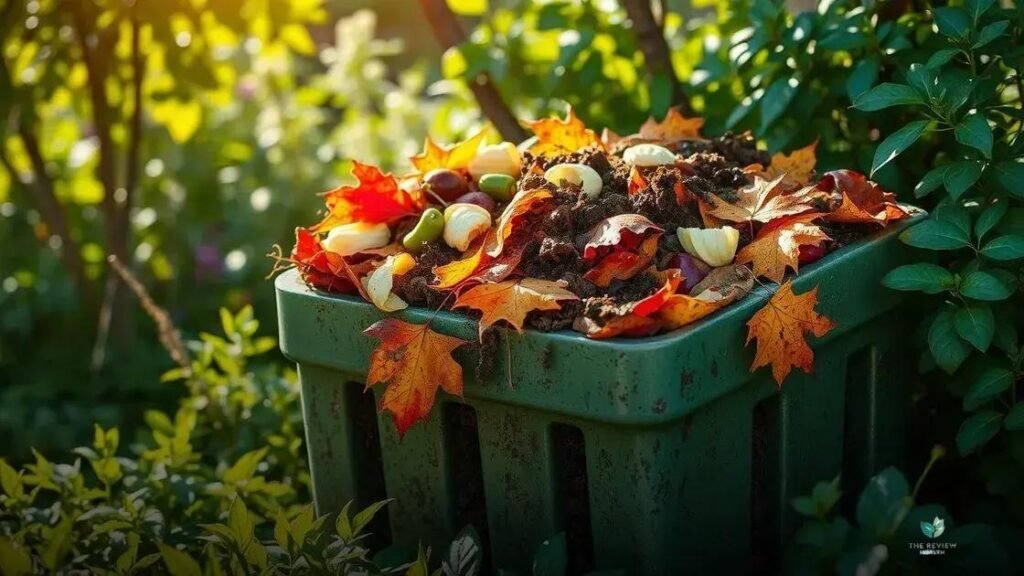Composting is a natural process that transforms organic waste into nutrient-rich compost, benefiting gardens and reducing landfill waste through the decomposition of materials like food scraps and yard debris.
Composting is more than just a trend; it’s a practical solution to reduce waste and enrich your garden. Ever wondered how you can turn kitchen scraps into nutrient-rich soil? Let’s dive in and explore how composting can transform your waste management approach.
Understanding the composting process

Composting is a natural process of decomposition where organic matter like food scraps and yard waste transforms into a nutrient-rich soil amendment called compost. This process is driven by microorganisms, including bacteria and fungi, that break down the organic materials in the presence of oxygen (aerobic decomposition). Understanding this process helps ensure efficient and effective composting.
Stages of Composting
1. Mesophilic Stage: Initially, moderate-temperature bacteria dominate, breaking down easily digestible materials, generating heat, and raising the compost pile temperature. This initial phase is crucial for the breakdown of simpler compounds.
2. Thermophilic Stage: As the temperature rises (130-160°F), heat-loving bacteria take over, further decomposing more complex organic matter. This high-temperature phase is essential for killing pathogens and weed seeds.
3. Cooling and Maturation Stage: The temperature gradually cools down as the readily available materials decompose, allowing mesophilic microbes to return and complete the composting process. During this stage, the compost matures and stabilizes, developing its characteristic earthy aroma.
Factors Affecting Composting
Several factors influence the composting process: Aeration ensures sufficient oxygen for the microbes, speeding up decomposition. Moisture is crucial for microbial activity but should be balanced to avoid anaerobic conditions. The carbon-to-nitrogen (C:N) ratio influences decomposition rates; a balanced ratio promotes optimal microbial growth.
By understanding these stages and factors, you can effectively manage your compost pile and achieve optimal results.
What materials can you compost?

Knowing what you can and cannot compost is crucial for successful composting. The right mix of materials provides the necessary nutrients for decomposition and creates a healthy compost pile.
Greens and Browns: The Composting Recipe
Composting relies on a balance of “greens” (nitrogen-rich materials) and “browns” (carbon-rich materials). Greens provide nitrogen, which fuels the decomposition process. Examples include:
- Fruit and vegetable scraps
- Coffee grounds and filters
- Grass clippings
- Tea bags
Browns provide carbon, which gives the compost structure and helps with aeration. Examples include:
- Dried leaves
- Shredded paper and cardboard
- Sawdust
- Twigs and small branches
Materials to Avoid
Certain materials should be avoided in your compost pile as they can attract pests, create unpleasant odors, or introduce harmful substances:
- Meat, bones, and fish scraps
- Dairy products
- Oils and fats
- Pet waste
- Diseased plants
- Treated wood
By carefully selecting the right materials, you can create a healthy and productive compost pile that benefits your garden and the environment.
Benefits of composting at home

Composting at home offers a multitude of benefits for both your garden and the environment. It’s a simple yet effective way to reduce your environmental impact and create a valuable resource.
Enriches Your Garden
Compost acts as a natural fertilizer, enriching your soil with essential nutrients. It improves soil structure, aeration, and water retention, leading to healthier and more productive plants. Using compost reduces the need for chemical fertilizers, promoting a more sustainable and eco-friendly gardening approach.
Reduces Landfill Waste
A significant portion of household waste is organic material that can be composted. By composting at home, you divert this waste from landfills, reducing greenhouse gas emissions and conserving valuable landfill space. This simple act contributes significantly to a healthier environment.
Saves Money
Composting can save you money on gardening expenses. By creating your own compost, you reduce the need to purchase fertilizers and soil amendments. This cost-effective solution also minimizes waste disposal costs.
Reduces the Need for Chemical Fertilizers
Chemical fertilizers can harm the environment and disrupt the natural balance of your soil. Compost provides a natural alternative, enriching your soil without the negative impacts of synthetic chemicals.
Connects You with Nature
Composting allows you to engage with natural processes and understand the cycle of life. It’s a rewarding experience to transform kitchen scraps and yard waste into a valuable resource for your garden.
Composting is a rewarding practice that benefits both your garden and the environment. By understanding the composting process, choosing the right materials, and recognizing the numerous advantages, you can embark on this eco-friendly journey. Transform your kitchen scraps and yard waste into valuable compost and contribute to a greener future. Start composting today and experience the positive impact it has on your garden and the planet.
FAQ: Common Composting Questions
What is composting?
Composting is the natural process of decomposing organic matter, such as food scraps and yard waste, into a nutrient-rich soil amendment called compost.
Why should I compost at home?
Composting at home reduces landfill waste, enriches your garden with natural fertilizer, saves money on gardening expenses, and minimizes the need for chemical fertilizers.
What materials can I compost?
You can compost a variety of materials, including fruit and vegetable scraps, coffee grounds, tea bags, dried leaves, shredded paper, and yard waste. Avoid composting meat, dairy, oils, pet waste, and diseased plants.
What is the ideal C:N ratio for composting?
A balanced carbon-to-nitrogen (C:N) ratio is crucial for efficient composting. Aim for a ratio of approximately 30:1 (browns to greens).
How long does it take for compost to be ready?
The composting process can take anywhere from a few months to a year, depending on factors like the materials used, temperature, and moisture levels.
How do I know when my compost is finished?
Finished compost will have a dark, rich color, an earthy aroma, and a crumbly texture. It will no longer resemble the original materials.

Sarah Thompson is a passionate advocate for healthy living and mindful lifestyle choices. With a background in nutrition science and years of experience as a wellness coach, Sarah dedicates her time to exploring the latest trends, research, and products that promote physical, mental, and emotional well-being.
As the lead writer for The Review Health , Sarah combines her expertise with a genuine love for helping others make informed decisions about their health. Her articles are designed to inspire and educate, offering practical tips, honest reviews, and science-backed insights to support readers on their journey to a healthier, happier life.
When she’s not writing or researching, Sarah enjoys yoga, experimenting with plant-based recipes, and spending time outdoors with her family.



